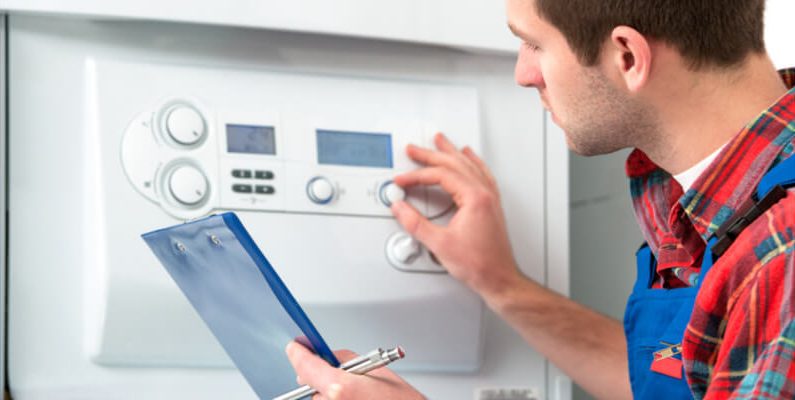Types Of Hot Water Boilers: The Ultimate Guide
The household boiler – possibly the most hardworking appliance in any home, working overtime to keep every inhabitant warm throughout the year and with a constant supply of hot water to boot. We all know the dreaded feeling of being left with no heating or hot water in the midst of Winter, so it’s vitally important to make sure that you have the best type of boiler for your home and that it is always kept in a good working condition.
As a general rule of thumb, boilers last around 15 years if looked after correctly; but even so, there will come a time when you will be looking to buy a new boiler for one reason or another. With many types of hot water boilers available, it can be a minefield when deciding which one will be best for your home. Having provided Boiler servicing in Yorkshire and the surrounding areas for many years, our team have seen every possible option available and have compiled the ultimate guide to help you choose the right one for you.
The 6 Main Types Of Hot Water Boilers
As boiler technology has developed, so have the choices, making it easier than ever to choose an appliance that fits all of your requirements. As far as household devices go, the boiler works harder than any other, making it imperative to keep in good condition at all times. Whether your old boiler is on the blink or you’d like to replace your existing appliance with a more energy efficient device, take a look at the top 6 types of boilers along with their pros and cons.
1. Combi Boiler
2. System Boiler
3. Conventional Boiler
4. Cogeneration Boiler
5. Energy Efficient Boiler
6. Condensing Boiler

1. Combi Boiler
Dubbed the most cost-effective option; the combi boiler is a popular choice amongst homeowners. Controlling both the hot water and central heating makes them incredibly energy efficient as well as convenient, as they heat water directly from the mains. This eliminates the need to have large water tanks, ultimately saving space and installation times. With reports stating that combi boiler owners save up to £300-£400 per annum on their energy bills, this type of boiler is unsurprisingly high up on many people’s lists. Take a look at Heatable for the best combi boilers on the market.
Advantages
- Unlimited heat & hot water
- Space saving
- Energy efficient
- Easier to maintain
- No waiting time for hot water
Disadvantages
- Cannot have two showers at the same time
- Not ideal for houses with low water pressure
- Not compatible with solar panels
- No backup heater should it break down
- Not ideal for larger homes
2. System Boiler
Also known as a ‘sealed system’, a system boiler requires a hot water cylinder but no water tank. These are great for larger houses or those that regularly use more than one bath or shower at a time. With more heating components built into this particular boiler type, such as an expansion vessel and a pressure release valve, the majority of heating takes place in the appliance itself. This in turn delivers a faster response and therefore is very economical to run. For a thorough breakdown of system boilers and whether it’s right for your property size, take a look at this guide from The Heating Hub. Green Match also have a great price comparison on system boilers available if this sounds like the option for you.
Advantages
- Ability to run several baths/showers/taps at once
- Quick and easy installation
- Space saving as no cold water tank required
- Fast hot water response time
- Compatible with solar thermal solutions
Disadvantages
- Storage room is required for the cylinder
- Hot water is limited to the size of cylinder you have
- Heat will be lost from water being held in the cylinder
- Hot water can run out
- Hot water isn’t instant

3. Conventional Boiler
These are also known as regular and open vent boilers, and have both a cylinder and a tank. Although these may not be the best space saving option, they do have the ability to heat large volumes of water that can be used from multiple showers or taps at the same time. These also have the ability to be used in conjunction with solar panels – a great option if you are looking to become more energy efficient. These boilers are good for houses with more traditional heating systems in place as necessary changes to your existing pipework will be minimal. Conventional boilers don’t rely on pressure from the mains supply, powering consistent hot water for use throughout a property. Check out some great conventional boiler options at The Heating Hub.
Advantages
- Can provide hot water to multiple showers/taps at the same time
- Good option even when mains pressure is low
- Compatible with solar panel systems
- Good choice if replacing on old system
- Compatible with backup immersion heaters so hot water will always be provided
Disadvantages
- Not good for small houses as requires a lot of space
- Without an accompanying immersion heater, hot water can run out
- Heat will be lost from hot water sitting in the cylinder
- Can be complicated to install if your house isn’t set up for this kind of boiler
- Hot water is not available on demand and needs to heat up
4. Cogeneration Boiler
Also known as a combined heat and power (CHP) boiler, this option produces heat and electricity from one appliance. While this process has generally been used by larger commercial properties, due to the increasing energy prices, it has made economic sense to introduce them to the domestic market. With the ability to save up to 40% on energy costs by using this kind of boiler, they are a very cost-effective option for those wanting to keep their bills down. There is also the potential to get government funding if you opt for this type of boiler, due to its energy efficient qualities.
Advantages
- Simple installation
- Very energy efficient
- Reduced CO2 emissions
- Cost-effective boiler
Disadvantages
- High initial costs to install
- Not suitable for all properties
- Still very new to the UK domestic market so not as developed
5. Energy Efficient Boiler
With the ever-increasing demand for energy efficient appliances, it was only a matter of time before a more sustainable boiler was created. The energy efficient boiler is becoming very popular, as more and more people want to minimise their carbon footprint and effect on the environment. While an energy efficient boiler isn’t a type as such, most modern day boilers would fall into this category due to new legislation. Even if your boiler is still functioning well and has life left in it, it could be worth having it replaced with a more energy efficient model. With heating counting towards over half of your household’s energy consumption, having an energy efficient boiler could make a massive difference to your bills. Take a look at the most energy efficient boilers of 2019 according to Energy Star.

6. Condensing Boiler
Like the energy efficient title, a condensing boiler is more of a trait then a type. Every new boiler is required by law to have a condensing feature in order to comply with energy regulations. Condensing boilers use latent heat as fuel, which would ordinarily escape into the atmosphere – therefore reducing emissions, making them very efficient and cost-effective. With reports suggesting that they are 90% efficient, an extra 10-15% than their non energy-efficient counterparts, it’s no wonder that this feature has become mandatory. The condensing trait has come a long way since first hitting the market in 2005 and has successfully worked its way through initial problems to become an important part of every boiler available to buy.
Which Boiler Is Best For Me?
While we hope our guide has helped to explain the complicated world of boilers a little, you may still be wondering which one would be best for you. Take a look at this extensive guide from The Eco Experts to look into each type in much more detail.
As reputable Plumbers in Yorkshire, we not only install and maintain boilers on a regular basis, but we also advise clients on the best appliances for their homes. We hope our article has at least helped you to narrow down the choices a little, based on your needs, property type and space you have, but if you would like any more advice at all, don’t hesitate to give the team at OMR and Plumbing a call!



